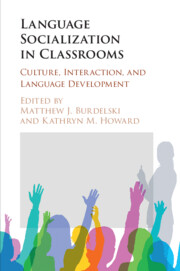Book contents
- Language Socialization in Classrooms
- Language Socialization in Classrooms
- Copyright page
- Dedication
- Contents
- Figures
- Tables
- Contributors
- Acknowledgments
- Transcription Conventions
- 1 Introduction
- Part I Socializing Values, Dispositions, and Stances
- Part II Socializing Identities
- 5 Learning to Be a Poet
- 6 Teaching Words, Socializing Affect, and Social Identities
- 7 Making the Familiar Change
- 8 Negotiating Epistemic Authority and Co-Constructing Difference
- Part III Language Socialization and Ideology
- Part IV Conclusion
- Index
- References
7 - Making the Familiar Change
Language Socialization via Contrapuntal Interaction in a US High School Language Arts Class
from Part II - Socializing Identities
Published online by Cambridge University Press: 10 February 2020
- Language Socialization in Classrooms
- Language Socialization in Classrooms
- Copyright page
- Dedication
- Contents
- Figures
- Tables
- Contributors
- Acknowledgments
- Transcription Conventions
- 1 Introduction
- Part I Socializing Values, Dispositions, and Stances
- Part II Socializing Identities
- 5 Learning to Be a Poet
- 6 Teaching Words, Socializing Affect, and Social Identities
- 7 Making the Familiar Change
- 8 Negotiating Epistemic Authority and Co-Constructing Difference
- Part III Language Socialization and Ideology
- Part IV Conclusion
- Index
- References
Summary
This chapter explores the contrapuntal nature of school and peer socialization among honors eleventh graders and their teacher in a US high school classroom as they negotiate expertise and identities over a lesson, across changing speech events and participation frameworks. The analysis shows how certain epistemic stance markers ratify or challenge peers’ knowledge and display flexible and relative understandings of expertise across shifting participation frameworks, and how students’ engagement with course material involves simultaneous identity displays to peers. Paradoxically, these identity displays, while done in ways that may index counterpositions to the teacher, also serve as points of classroom engagement. The analysis deconstructs the distinction between “unofficial” peer socialization and “official” academic learning, illuminating how an experienced teacher and gifted teens build classroom community and learning through contrapuntal discourse that accomplishes both goals. The findings suggest that teachers and administrators concerned with classroom management might do well to consider building this contrapuntal rhythm, rather than muting students’ contribution to it.
Keywords
- Type
- Chapter
- Information
- Language Socialization in ClassroomsCulture, Interaction, and Language Development, pp. 132 - 157Publisher: Cambridge University PressPrint publication year: 2020
References
- 2
- Cited by

